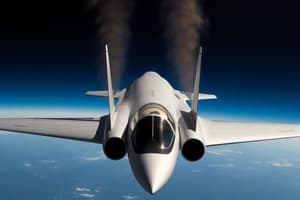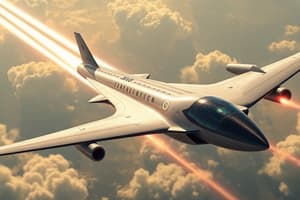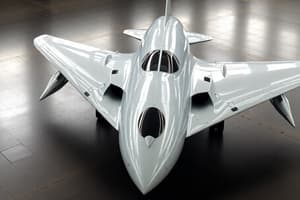Podcast
Questions and Answers
What is a primary goal of NASA's X-59 aircraft?
What is a primary goal of NASA's X-59 aircraft?
- To reduce the speed of aircraft below the sound barrier.
- To enable supersonic flight without generating sonic booms. (correct)
- To increase the intensity of sonic booms during flight.
- To enhance the visibility of aircraft during flight.
According to the characteristics of supersonic speed, what is the approximate speed that qualifies as supersonic?
According to the characteristics of supersonic speed, what is the approximate speed that qualifies as supersonic?
- 600 mph (965 km/h)
- 768 mph (1,236 km/h) (correct)
- 850 mph (1,368 km/h)
- 500 mph (805 km/h)
What aspect of the X-59’s design does Peter Coen emphasize in relation to air travel?
What aspect of the X-59’s design does Peter Coen emphasize in relation to air travel?
- Enhancing fuel consumption rates significantly.
- Utilizing outdated technology for reliability.
- Increasing overall aircraft weight for safety.
- Making air travel over land quieter and faster. (correct)
Which statement best reflects a common challenge associated with traditional supersonic flights?
Which statement best reflects a common challenge associated with traditional supersonic flights?
What mission does the X-59 aircraft belong to within NASA?
What mission does the X-59 aircraft belong to within NASA?
What is the primary purpose of the long, pointed nose design on the X-59 aircraft?
What is the primary purpose of the long, pointed nose design on the X-59 aircraft?
What advanced technology replaces the traditional cockpit window in the X-59?
What advanced technology replaces the traditional cockpit window in the X-59?
When is testing for the X-59 scheduled to begin?
When is testing for the X-59 scheduled to begin?
What is one of NASA's hopes for the data collected during the X-59's flights?
What is one of NASA's hopes for the data collected during the X-59's flights?
If the testing of the X-59 proves successful, what is one potential outcome by 2030?
If the testing of the X-59 proves successful, what is one potential outcome by 2030?
Flashcards are hidden until you start studying
Study Notes
NASA's X-59 Aircraft
- X-59 is a prototype aircraft designed to travel at supersonic speeds without producing a sonic boom.
- The aircraft is part of NASA's Quiet SuperSonic Technology (QueSST) mission, aiming to make supersonic flight over land safer, sustainable, and quieter.
- The X-59's unique design features enable it to break the sound barrier without generating the characteristic sonic boom.
- The X-59's long pointed nose helps break up shockwaves, which are a major source of noise.
- The aircraft's forward-facing cockpit window has been removed, replacing it with advanced cameras to reduce noise transmission.
- The engine is positioned atop the aircraft, deflecting noise away from the ground.
X-59 Testing and Goals
- Testing of the X-59 will begin in California in late 2024.
- The X-59 will fly over US cities to assess the sound it produces.
- NASA aims to use the gathered data to persuade airline officials to reconsider regulations prohibiting supersonic flights over land.
- If successful, the X-59's technology could pave the way for new commercial passenger and cargo aircraft by 2030.
Studying That Suits You
Use AI to generate personalized quizzes and flashcards to suit your learning preferences.





